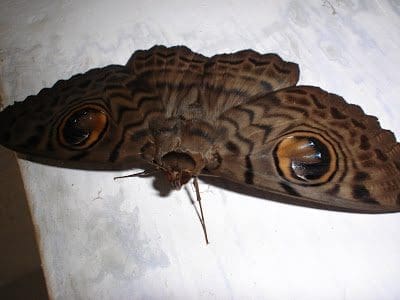
With the arrival of monsoons and the proximity of the western ghats with its rich tropical ecosystem the bugs start invading the homes and hostels. One of the larger varieties of moths came visiting the Department just last week. I do not know which species it belongs to , but i captured it anyway (on film). Moths are nocturnal counterparts of butterflies by the way and tend to rest during the day time. This one amazed me because of its unusual size, the largest i have seen.
This is what wikipedia says:
A moth is an insect closely related to the butterfly. Both are of the order Lepidoptera. The division of Lepidopterans into moths and butterflies is a popular taxonomy, not a scientific one. Sometimes the names “Rhopalocera” (butterflies) and “Heterocera” (moths) are used to formalize the popular distinction. Many attempts have been made to subdivide the Lepidoptera into groups such as the Microlepidoptera and Macrolepidoptera, Frenatae and Jugatae, or Monotrysia and Ditrysia. Failure of these names to persist in modern classifications is due to the fact none of them represents a pair of “monophyletic groups“. The reality is that butterflies are a small group that arose from within the “moths,” and there is thus no way to group all of the remaining taxa in a monophyletic group, as it will always exclude that one descendant lineage. Most species of moth are nocturnal (which means they are active at night), but there are crepuscular and diurnal species. They can be distinguished from butterflies in several ways. People who study butterflies and/or moths are called lepidopterists; the study of butterflies is known as butterflying, and the study of moths mothing, the latter giving rise to the term “mother” for someone who takes part in this activity—sometimes written with a hyphen inserted (moth-er) to distinguish it from the word for a female parent. This confusion does not arise in spoken English since the two terms are pronounced differently.



Be the first to comment